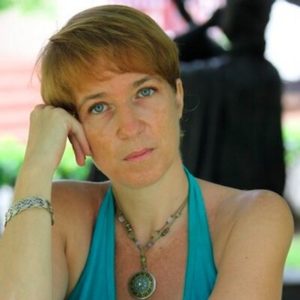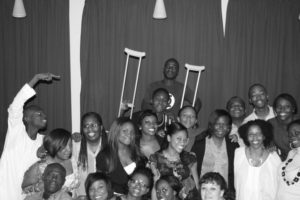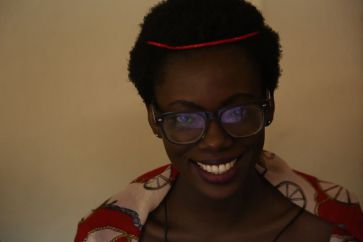On Farafina day zero, I arrived at the hotel hungry. At first it was just the hotel room, my hunger, and me pondering the stark loneliness that seemed embedded into the room and its matching shades and bed sheets, the symmetry of the paintings hung on the wall, and the cold floor. I went to search for my friend—who I’d known for the best part of the decade and was lucky to be accepted into the workshop with—who had just arrived, and together we went on a quest to fill our bellies. I should have known eating apples for lunch, and nothing for breakfast, before traipsing across the city jumping buses with my bag wasn’t the best plan for the day.
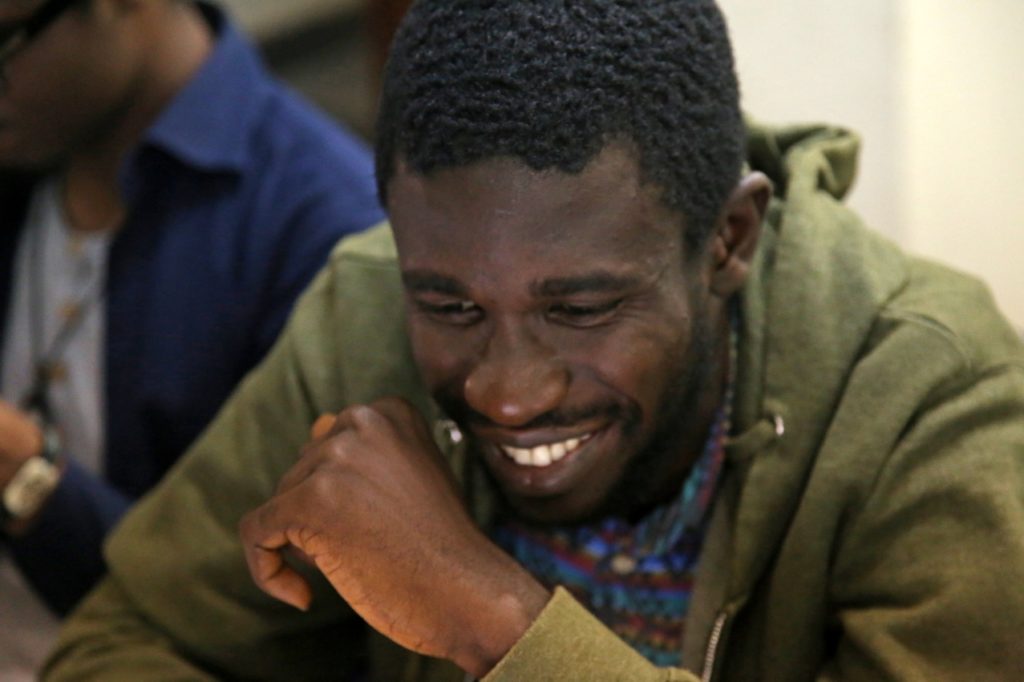
Later that night, we all gathered at the restaurant, fatigue in our faces, but desire too to see the name that drew us all to the workshop. We of course met an Adichie, just not the one we hoped to meet. In Okey we had the best of hosts, and his smile, even if it wasn’t enough to coax enthusiasm out of our sluggish bodies, was enough assurance that we were in good hands. We trudged into our rooms for the night, not communicating with one another, an act that continued for the first two days of the workshop in what Pamela, our class sleuth, would eventually call carrying shoulder. On the third day, the class arose. Walls were pulled down after a minor ruckus caused by mismanaged emotions. And in the concluding days of the workshop, we grew from strangers to friends to family. We agonised over assignments together, play charades and made fun of ourselves, and took long walks at nights exchanging stories and holding them to heart.
Writing this memoir piece has proven to be more difficult than I ever imagined, not because there is nothing to say, or that there’s too much to say that it makes extraction impossible, but because it has been difficult to translate my experience into a coherent narrative. Compared to stories of other Farafina workshops, the events in class of 2016 are relatively banal, but this, perhaps, is what makes them even more profound. There is, for example, that night in Room 216 where Miracle was trying to act out Crouching Tiger, Hidden Dragon for her group in a game of charades. There was the comedy of her theatrics, all of us howling, and the reception calling to restrain us. It was no party, no wild night, but it was intimate enough and not the usual reception-baiting ruckus. Or that moment after Umar’s story was read when Binj covered his mouth and shook his head as the rest of the class stood in ovation. We had more of those moments: wonder brought by reading something none of us expected. I can’t forget Chisom’s thirteen story and how even before the story’s end I looked to Aishat sitting beside me and asked if she saw what was happening. Of course we all did at the time, but again, how do I express that wonder to you without sounding like I’m parroting nonsense.
People who came to observe us, like a lot of the alumni did, agreed that we were a boring Farafina class. No bar revelries deep into the morning, no sexual escapades, no fantastic stories that could be distilled into Farafina myth and used to oppress/impress future classes.
We all wondered whether we were good enough, whether our work was good enough. It wasn’t a class of woke writers preparing to take the literary world by storm, but just people who cared about people, cared about stories, and wanted to tell them as best as they could. How do I describe Fatima’s face every time she was done reading in her calm sing-song voice, waiting for the comments of the facilitators and the class on her story, and the way it broke open in pleasure whenever she heard that we enjoyed her writing, like she had never entertained the possibility that her work was worthy of admiration? It is easy to be gifted and to get extremely cocky by reason of that gift, so to look at the people in Farafina 16 was to be taught, again and again, a lesson in humility and grace
Speak with many alumni of the workshop and the thing you would hear is that Farafina is often as good as the writers you share the class with. But everything about the workshop experience was great: the other participants, the exercises, the discussions, and the facilitators. This grace displayed by the participants didn’t spring out of nothing. It had everything to do with our facilitators. Up to the moment where Chimamanda showed up in class, one of us was still doubtful about the realness of the workshop. She was ready to leave if Chimamanda did not show up, fearing a Lagos scam. But from the moment she entered the class, started the introductions, and took notes as we spoke, everything became real. The facilitators set out, not just to teach but create a place where we could be a lot more humane than we were when we entered the hotel.
***
On day two of the workshop, after reading my assignment to the class, Chimamanda looked at the projected words on the screen and said, “I don’t understand what is happening in this piece.” It sounded like a damning assessment of something I’d carefully crafted. After another assessment by Binj of a story I’d written, she leaned out of her seat, and looked at me, smiling as she repeated his comments, “Did you hear that? The story is brilliant but it has no heart.” If this is all I told you about my interaction with her throughout the workshop, there’s no judging how you’ll read it. But the insidious thing that would have done is take out all the other times she spoke really well of my effort.
She took our work and us seriously, a little more than I expected from someone who could have been condescending and we would have forgiven her. Because, let’s face it, she owes no one the attention she gives and how much of herself she spreads out in the workshops. She was like that with every one of us: paying close attention to what we were trying to do, listening to our stories, remembering minor details, and pointing out how the little things matter, even when it took some time for us to see it ourselves.
Chimamanda leaning back in seat, asking Umar to turn back a page in a story so she could get the full gist of the narrative; Chimamanda imitating Nnamdi’s habit of sagging his arms, dropping his shoulders and relaxing his spine in mock surrender; Chimamanda smiling, her face open and expressive in excitement as she asks one of the more quiet members of the class to share what she whispered: “Did you hear what she just said? Tell them what you said.” Too many Chimamanda images to commit to memory, but perhaps nothing beats the look in her face when, after a brief moment of pondering, she shared what she considers her greatest fear, and then witnessing its stark opposite—joy—as she talked, in the cafeteria, about the process of writing her then freshly-published New York Times piece. Seeing her animated by stories, the things I am also often excited about, made Chimamanda the god more Chimamanda the human: hated by many, worshipped by many more, but in spite the best efforts of both groups never ready to shave off any part of humanity for their convenience.
***
In the days leading up to the workshop, a friend had been concerned about the version of Binyavanga we would get. My initial knowledge of Binj was via his memoir, then his Tweetstorms, then seeing this rapid-talking explosive fuzz-ball of literary energy chat with people at Ake Festival in 2014. But there was no way to anticipate the kindness of Binyavanga, whose sessions became the highlight of my Farafina experience. Sure, the rapid-talking part of pre-stroke Binj was gone but the sharpness of his mind is still very present. His email to us said, “…to put your heads in the right place” and that’s exactly what he did to us under the inspiration of Wangechi Mutu’s art. For the stories he loved, he would stand, walk towards the screen as the writer read, then clap and ask for an encore. For those he didn’t like, he said just that: “Hmmm, I don’t like it.” Then he would go on to show what he thought was wrong with the story and request a rewrite. Over multiple sessions of looking at my stories, even those outside of the workshop assignments, he gave what still is the most valuable writing advice I’ve ever gotten. If Chimamanda’s class was about taking us to the place where our writing could speak about and to the human condition, Binyavanga’s was about evoking a sense of wonder.
Aslak, the big man from Norway with the handwriting straight out of cartoons of my childhood, was the one whose aphorisms became class mantras. “Go where it hurts.” His wonderful gift of trimming a story to its bare essentials, and splitting open what is left to reveal truths hitherto hidden to even its writer was shown again and again to the point where we could attempt a mimic of his ability. And Eghosa’s closing sessions of the gritty parts of writing and publishing, delivered in vintage wafi-boy humour, was a fine end to the workshop experience.
***
In the days leading to the workshop, another friend asked if I was excited. I wasn’t. 2016 had been filled with failures, rejections and setbacks. What I felt was relief. I had nothing to look forward to in Farafina, nothing to anticipate. But I left the hotel on Saturday afternoon with a lot more than I can recount in an essay. The graciousness of the strangers I encountered and their ability to expand their selves to make room for my stories and eccentricities was refreshing. Months after the end, I’m still trying to come to terms with what has happened, with what has enabled me rediscover the hunger for stories and the joy in creating them. Because, in the end, it wasn’t excitement I needed; it was that joy.
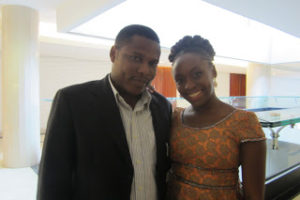 understand the reluctance with which I applied for this year’s workshop. I felt I did not need any coaching from any writer, no matter how renowned. It was easy to learn about writing, especially with the internet. Having convinced myself that I didn’t need to learn from people who turned me down twice, I tried to forget about the call for entries, to ignore the nagging urge to type a small bio, copy and paste one of my numerous short stories and send another mail to Udonandu, whoever that is.
understand the reluctance with which I applied for this year’s workshop. I felt I did not need any coaching from any writer, no matter how renowned. It was easy to learn about writing, especially with the internet. Having convinced myself that I didn’t need to learn from people who turned me down twice, I tried to forget about the call for entries, to ignore the nagging urge to type a small bio, copy and paste one of my numerous short stories and send another mail to Udonandu, whoever that is.
